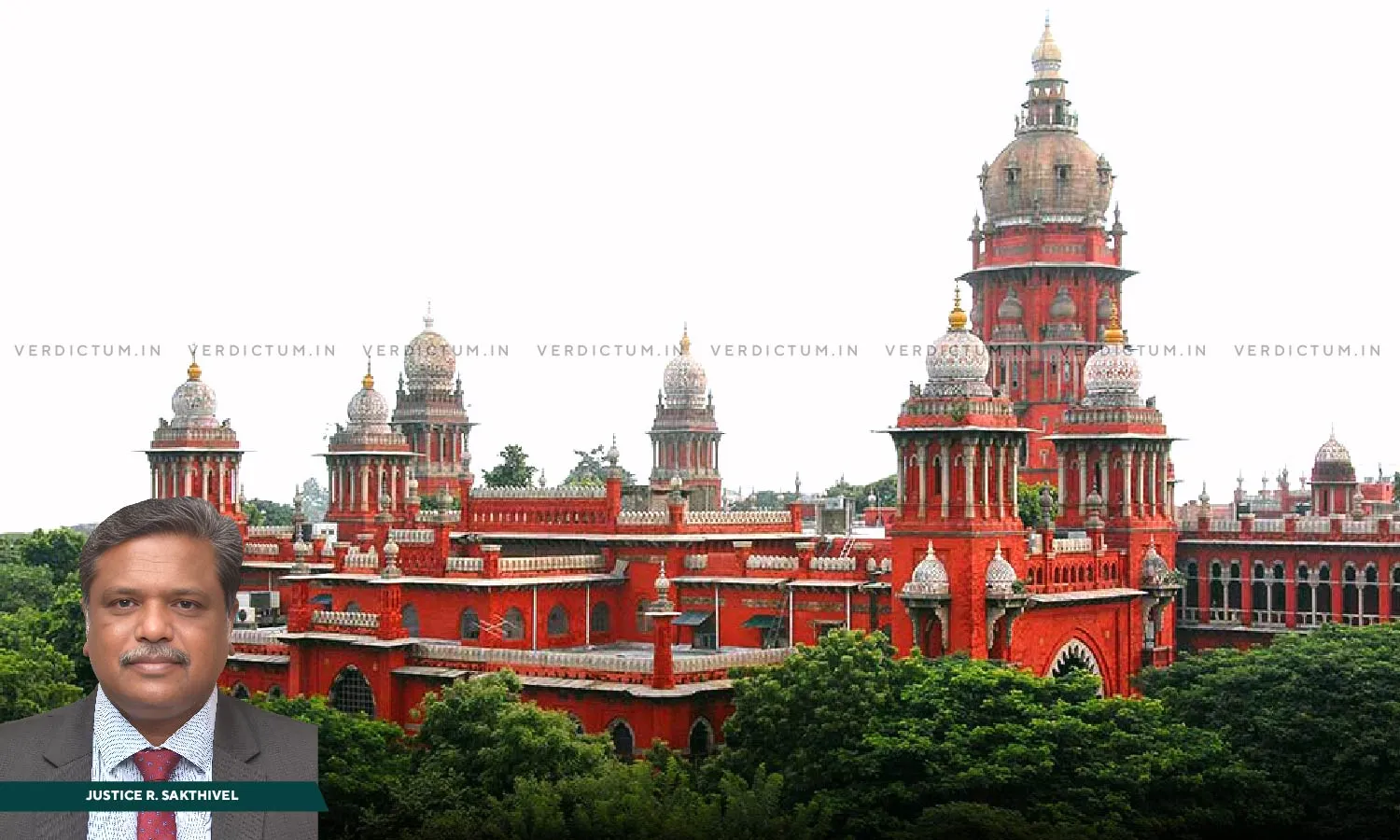Oral Partition Without Documentary Proof Cannot Defeat Daughter’s Right As Coparcener Under 2005 Amendment Of Hindu Succession Act: Madras High Court
The Court held said that general claims of separate enjoyment are insufficient to establish oral partition, and a daughter’s right as coparcener cannot be defeated without concrete proof of division before the 2005 amendment.

Justice R. Sakthivel, Madras High Court
The Madras High Court has held that oral partition in ancestral property must be proved by clear and convincing evidence, observing that mere separate enjoyment or kist receipts are insufficient in the absence of records showing demarcation, sub-division or independent title. It upheld a daughter's claim to coparcenary rights under the Hindu Succession (Amendment) Act, 2005, despite her marriage prior to its enactment, since no partition had been established.
A Single Bench of Justice R. Sakthivel observed, “The moment the Hindu Succession (Amendment) Act, 2005 was introduced, the plaintiff’s right of coparcenary by virtue of her birth was given enforcement and the plaintiff became a coparcener to the Suit Properties entitled to equal share to that of her brothers.”
The Court added, “…kist receipts do not prove separate possession and enjoyment. Separate patta, separate possession, demarcation by ridges, sub-divisions, separate dealings etc., are some of the elements that may be recognized to prove oral partition.”
Advocate Deepika appeared for the Appellants, while Advocate M. Sridhar represented the Respondents.
Brief Facts
The Plaintiff No.1 is the daughter of two of the Defendants and filed a suit seeking partition and separate possession of her share in the joint family properties. She contended that although members of the family had been living separately for convenience, they were cultivating the suit lands jointly and deriving income in common. After her demand for partition was refused, she filed the suit. During the pendency of the proceedings, her father died intestate.
The Defendants alleged that an oral partition had already taken place between some of the parties and that the Plaintiff No.1 had no right since she was married before the commencement of the amendment. It was further claimed that the Plaintiff No.1 had been provided for during marriage through customary seer and expenses, and that she was not in joint possession.
The Trial Court rejected the plea of partition and held that the Plaintiff No.1 had become a coparcener under the 2005 amendment. It granted her 8/49 share in the properties and restrained the Defendants and the registering authority from effecting any alienation.
Reasoning of the Court
The Court examined whether the plea of oral partition was substantiated by acceptable legal evidence. It found that the materials relied upon were inadequate, noting, “These kist receipts do not prove separate possession and enjoyment. Separate patta, separate possession, demarcation by ridges, sub-divisions, separate dealings etc., are some of the elements that may be recognized to prove oral partition.”
Referring to the documentary evidence produced by the Plaintiff No.1, the Court noted that the pattas continued to stand in the name of the father and that this supported the conclusion that no prior partition had taken place. It observed, “There is no oral or documentary evidence to show that the Suit Properties were partitioned among the Defendants.”
Addressing the question of coparcenary rights, the Court reiterated that the Plaintiff No.1 was entitled to a share under the Hindu Succession (Amendment) Act, 2005, stating, “The moment the Hindu Succession (Amendment) Act, 2005 was introduced, the plaintiff’s right of coparcenary by virtue of her birth was given enforcement and the plaintiff became a coparcener to the Suit Properties entitled to equal share to that of her brothers.”
The Court rejected the contention that the plaintiff had been adequately provided for at the time of marriage. It added, “Extensive spending on the marriage as well as the Seer…cannot be used as a defence to deny the plaintiff of her coparcenary rights over the Suit Properties.”
Taking an exception to the blanket injunction passed by the Trial Court, the Bench clarified, “…the plaintiff and the defendants are co-parceners and the plaintiff is entitled to 8/49 share in the Suit Properties. The Trial Court is right in concluding that the plaintiff is entitled to the benefit of Act 39 of 2005 and that the plaintiff is a co- parcener by birth in respect of the Suit Properties along with her father and siblings. However, the Trial Court is not justifiable in granting permanent injunction against the defendants 2 to 6 and the seventh defendant in respect of the entire extent of the Suit Properties. Right to property is a Constitutional right guaranteed under Article 300-A of the Constitution of India and the co-parceners are entitled to deal with their own share as per law subject to Section 6 of the Hindu Succession Act, 1956. Hence, such a blanket injunction cannot be granted in respect ofthe entirety of the Suit Properties..”
Accordingly, the Court partly allowed the appeal. It modified the Trial Court’s decree by declaring that the Plaintiff No.1 was entitled to an 8/49 share in the suit properties and passed a preliminary decree to that effect. It restrained defendants 2 to 6 and 8 from alienating or encumbering the suit properties in a manner that would prejudice the plaintiff’s share until partition is effected. The suit was dismissed as against the seventh defendant..
Cause Title: Raju Gounder (Died) & Ors. v. Kala & Anr. (Neutral Citation: 2025:MHC:1776)
Appearance
Appellants: Advocate Deepika
Respondents: Advocates M. Sridhar, B. Tamil Nidhi


